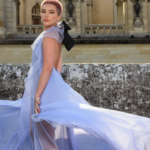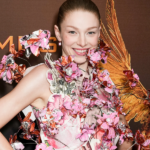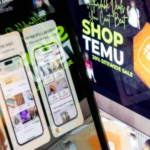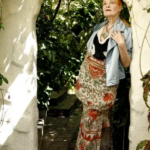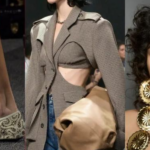The alleged demise of skinny jeans was the first. Next came the comeback of baby tees, halter tops, and cargo pants.
Retailers can all agree that Gen Z is hot for the early 2000s fashion trends that are currently experiencing a huge surge in popularity.
Young employees and college interns are wearing wide-legged slacks to work. Retro hair staples like the claw clip are back, along with mesh tops, miniskirts, and a wide range of vibrant clothing that can give customers the appearance of having just stepped out of a 2004 Disney Channel program.
Driven by social media sites such as TikTok, the so-called Y2K trend reappeared when people started going out and attending parties following pandemic lockdowns. In addition to straight-leg jeans making a reappearance and hair accessories like butterfly clips, other trends include all-denim clothing, flare and cargo pants, and anything shiny.

Trend analyst Casey Lewis of New York saw so many microtrends—often labeled with the suffix “core”—picking up steam in the last few years that she decided to write a newsletter about them.
Consider “Barbiecore” and “mermaidcore,” which draw attention to the hot pink that is reminiscent of the Barbie doll manufactured by Mattel Inc. or the sheer fabrics that have sequins and an oceanic color scheme. Another trend that has emerged from the “coastal grandmother” trend is the youthful “coastal granddaughter,” which is characterized by oversized cardigans and linen sets.
“Gen Z isn’t even close to finished resurrecting these outdated trends,” according to Lewis, whose newsletter “After School” tracks teenage purchasing habits. “They are going to dig into every weird trend from way back when and bring it back.”
The styles are being promoted in ads and on shelves by retailers ranging from fast fashion chains and discount stores to upscale Nordstrom. Customers appear to be consuming it as well.
Retail purchase tracking company Circana reports that from January to May, the most recent month for which data is available, sales of women’s cargo pants increased by 81%. Budget clothing retailers H&M and Zara claim that biker jackets, denim clothing, and crop tops are popular. Additionally, Shein, a Chinese fast-fashion retailer targeting young women, reported that sales of baby tees have tripled this year, making them the hottest tee trend of 2023.
The business is also witnessing a sharp increase in sales of metallic-colored apparel, flared pants, corset tops, and women’s track suits, many of which are constructed of vivid velour fabric that is evocative of certain outfit selections made by socialite Paris Hilton during her heyday.
It falls into the McBling era, which coincides with Y2K but is characterized by gaudier goods embodied by labels like Juicy Couture and Baby Phat, the legendary streetwear collection by TV personality and designer Kimora Lee Simmons, which made a comeback in 2019.
As usual, models like Bella Hadid, whose wardrobe choices are scrutinized by fashion magazines and other observers, are the driving force behind trends. Additionally, social media allows customers to express their style directly, which challenges retailers who are used to runway shows dictating trends.
“These trends won’t be apparent a year in advance,” according to Kristen Classi-Zummo, an analyst for Circana that covers fashion apparel.

Retailers, such as Macy’s and Walmart, have stated that they are monitoring social media posts more closely and looking into what users search for. However, according to Jake Bjorseth, the owner of trndsttrs, an organization that assists businesses in connecting with younger customers, it can be difficult to distinguish between trends that are merely attention-getters and those that consumers will truly purchase.
The editorial director of Walmart’s fashion apparel division, Alison Hilzer, stated that she also notices a lot of microtrends. It can be hard to know when to jump on some because some are more durable than others.
The discounter, which sells Barbiecore and cargo pants with Y2K inspiration, has been accelerating development to bring trends to market sooner, though the company declined to provide more precise information. Important influencers like Alix Earle, who has worked with celebrities like Selena Gomez, are also being followed by Walmart.
Retailers target younger customers, but many of them aren’t actually making purchases. Instead, according to research by Boston Consulting Group and Vestiare Collective, a French luxury resale website, they are dressing out of each other’s closets, contributing to a resale market that has tripled since 2020. The main factor was affordability, but consumers also purchased used goods to support the environment.
Graduate student Yasmeen Bekhit, 22, of Manheim, Pennsylvania, said she shops at resale sites like Depop, which has a lot of Y2K-heavy options like baguette bags and baggy jeans, and she visits a nearby thrift store almost every week.
Bekhit usually wears flare-legged jeans, flowy looser pants, and tighter shirts like mesh tops to keep cool during the summer months when she wears a headscarf. She claimed that she was inspired by the hair and makeup styles of former Disney Channel stars like Selena Gomez and Hilary Duff.
Popular TikTok influencer Aliyah Bah, who gained over 2.5 million followers by showcasing her “Aliyahcore,” a Y2K-inspired look, is also an inspiration to Bekhit. The style is a little more off-beat; crop tops, fishnet tights, and fuzzy knee-high boots are frequently worn with miniskirts or shorts.
“Her approach to outfit styling is truly amazing,” Bekhit remarked.
However, Bekhit said that she usually searches social media for outfit inspiration and adds her own personal touch.
Another trend in hair is retro. Master stylist Tahlya Loveday of The Drawing Room New York Salon reported seeing a greater number of ’90s and Y2K trends, including spiky updos and space buns, bouncy blow-dried looks, and block coloring, which involves coloring sections of hair in contrasting colors. According to her, Gen Z clients prefer those styles over millennial ones.
“This is all new to Gen Z,” Classi-Zummo of Circana stated. They’re not actually living it again. They are therefore sort of understanding it for the first time, even though we might see it as something that is cyclical and returning.”

